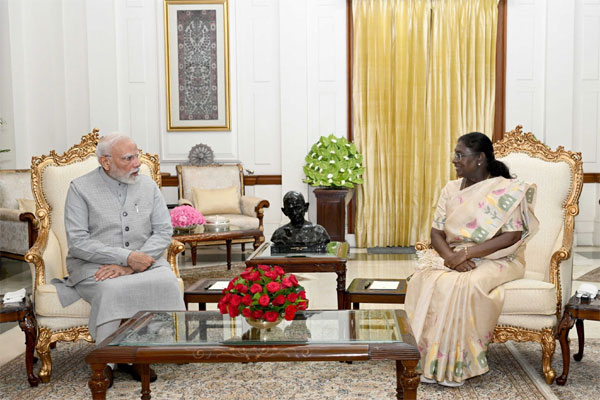Daijiworld Media Network - New Delhi
New Delhi, Sep 7: In the often ceremonial relationship between the President of India and the Prime Minister, gestures matter — and sometimes, they echo far beyond the corridors of Rashtrapati Bhawan.
On Saturday, Prime Minister Narendra Modi met with President Droupadi Murmu upon returning from a high-stakes diplomatic tour of China and Japan. The meeting wasn’t merely symbolic. It was part of an unwritten but time-honoured practice: the Prime Minister briefing the President after major international engagements — a tradition that Modi has consistently followed throughout his tenure.
His recent trip to Tianjin, China, for the 25th Council of Heads of State of the Shanghai Cooperation Organization (SCO) involved key discussions on global governance, counter-terrorism, and economic collaboration. Modi also held bilateral talks with Chinese President Xi Jinping and Russian President Vladimir Putin. Upon returning, he ensured that President Murmu was updated personally — reinforcing the President’s role as the constitutional head and custodian of national interest.

This act of protocol was highlighted by RSS ideologue and Thuglak editor S Gurumurthy, who drew a sharp historical contrast. In a post on X (formerly Twitter), he recalled the strained relationship between President Giani Zail Singh and Prime Minister Rajiv Gandhi in the 1980s.
Gurumurthy claimed that Zail Singh had once confided in him, expressing anguish over Rajiv Gandhi’s refusal to follow the same protocol — choosing not to brief the President after foreign visits. He recounted drafting a letter of protest on Zail Singh’s behalf, later refined by The Indian Express' then-editorial adviser Mulgaonkar and published in March 1987 — a letter he believes was the first crack in Rajiv Gandhi’s faltering administration.
According to Gurumurthy, a cascade of political scandals — from the Fairfax case to the Bofors revelations — followed soon after, plunging the Rajiv government into turmoil. “Rajiv never recovered thereafter,” he wrote, suggesting that the breakdown of decorum between the two top offices was symptomatic of deeper institutional failings.
The Zail Singh–Rajiv Gandhi standoff, remembered for its tension and public fallout, had marked a rare moment in Indian political history when the relationship between the Rashtrapati and the Prime Minister's Office descended into distrust and open defiance.
By contrast, PM Modi’s consistent briefings — first with President Ram Nath Kovind, now with President Murmu — have been seen by observers as a conscious effort to maintain institutional balance and mutual respect between the highest constitutional offices.
Political analysts note that while the President’s role is largely ceremonial, respecting the office affirms the core values of the Constitution — something Modi appears to emphasize through such protocols.
“It’s more than just courtesy — it’s a statement on governance,” a political observer noted. “Where Rajiv Gandhi let friction define his relationship with the President, Modi seems intent on letting decorum and duty guide his.”
At a time when democratic institutions globally are being tested, the PM’s gestures may appear small, but they serve as reminders: power, in a republic, is bound by restraint. And in the theatre of politics, sometimes it’s the silent handshakes and closed-door briefings that say the most about the strength of a democracy.